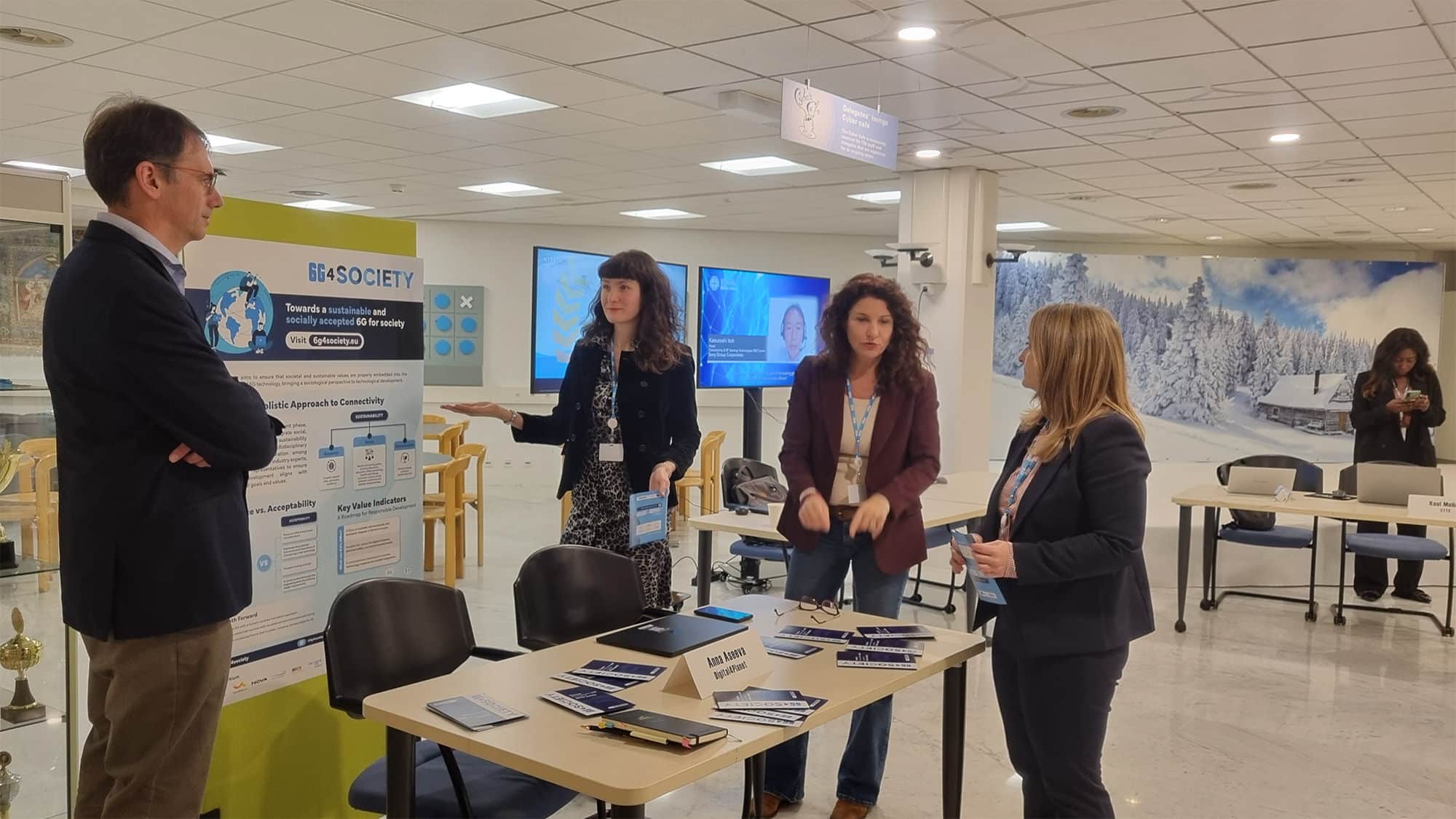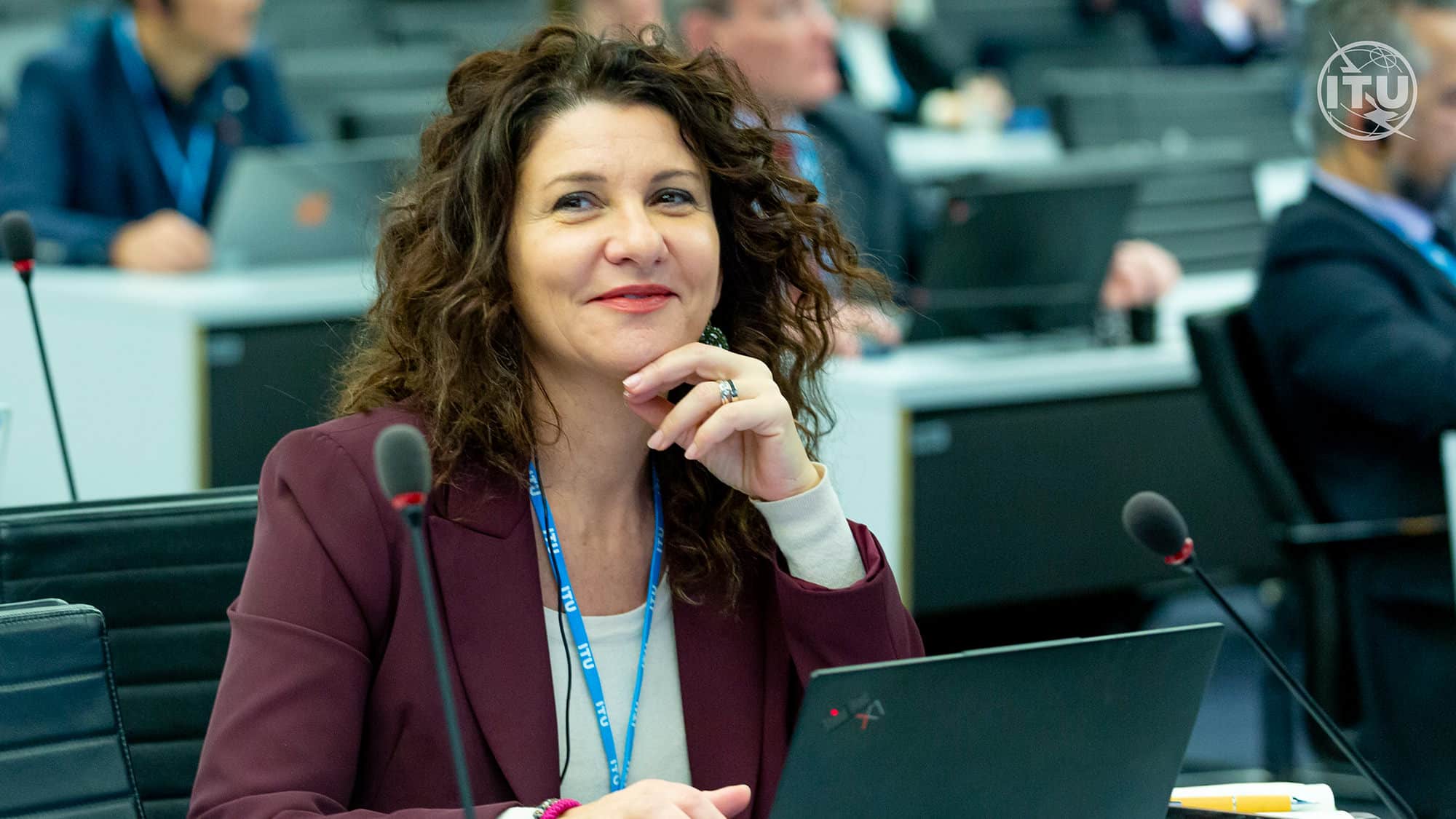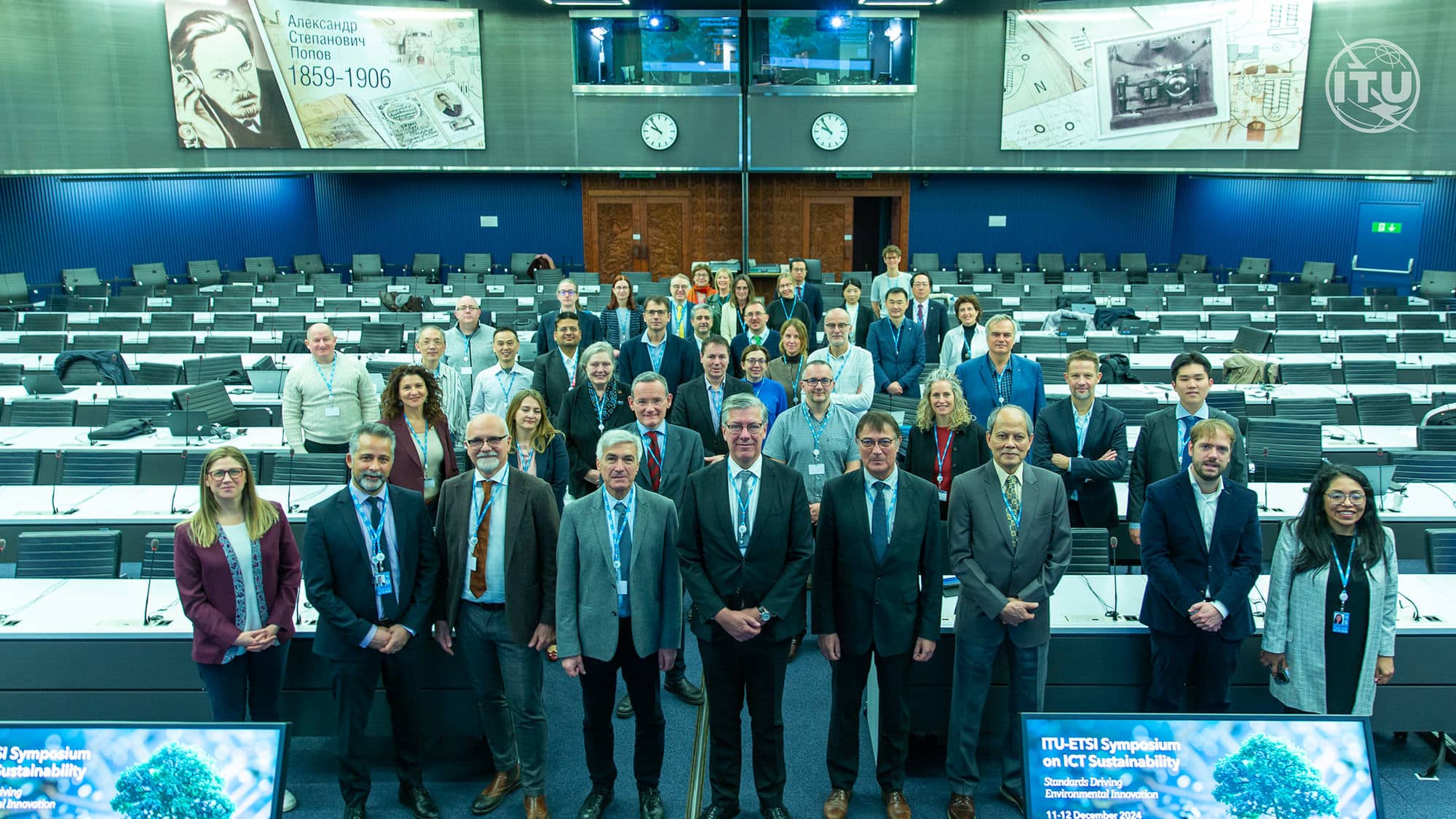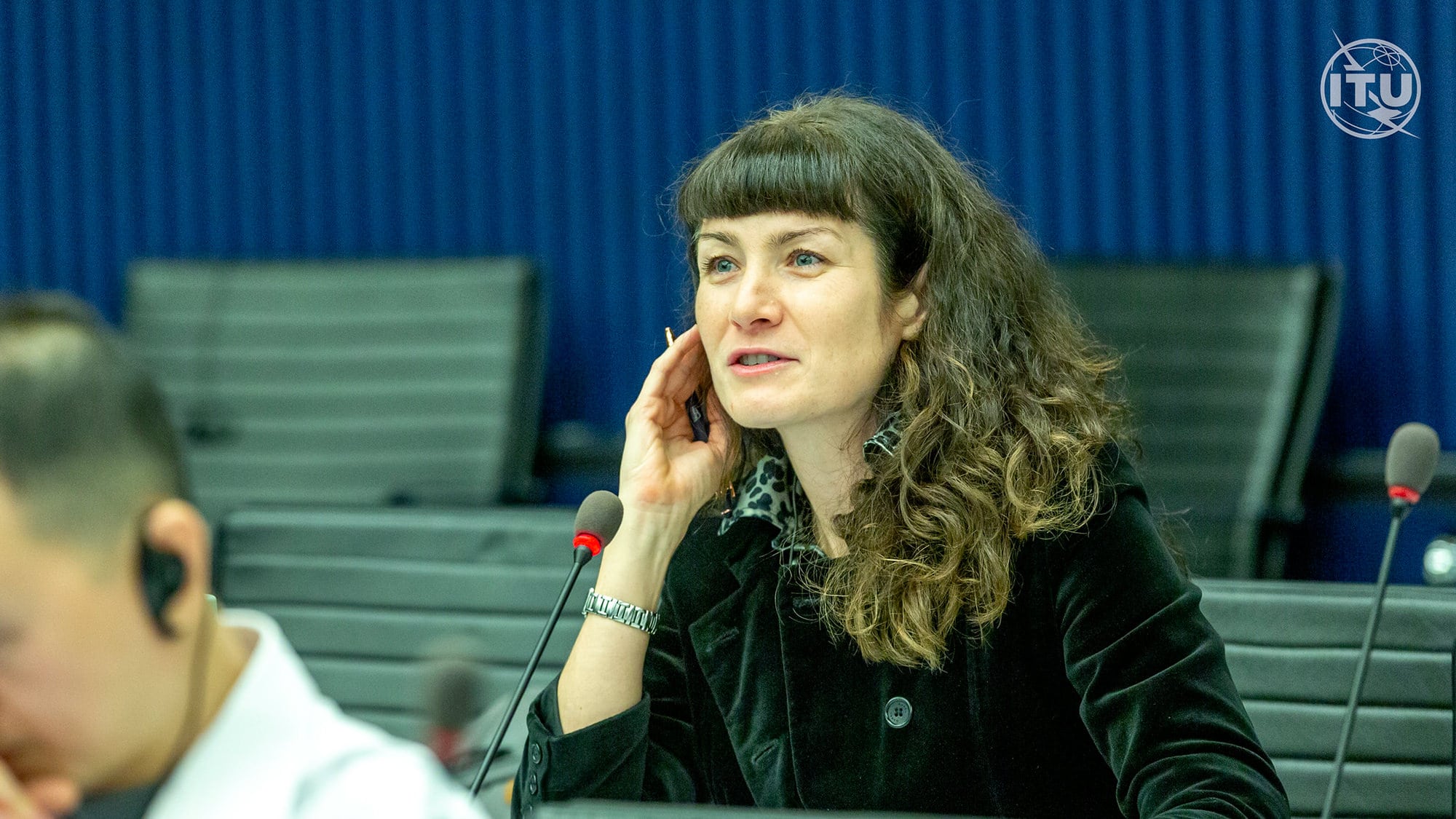6G4Society at the ITU-ETSI Symposium on ICT Sustainability: Standards Driving Digital Sustainability
Post-event report

With innovative technologies serving as a catalyst for participatory creativity toward a sustainable future, 6G4Society was proud to contribute to the dialogue and action on this critical topic. Reflecting this commitment, Dr Monique Calisti (CEO of Martel Innovate), the Coordinator of the 6G4Society project, Dr Marja Matinmikko-Blue (6G Flagship), a member of the advisory board of 6G4Society, and Dr Anna Aseeva, a sustainability expert from partner organisation Digital for Planet (D4P), participated in the Day-1 of the ITU-ETSI Symposium on ICT Sustainability: Standards Driving Environmental Innovation, held on 11–12 December 2024 at the ITU Headquarters in Geneva, Switzerland. This symposium provided a platform for industry leaders, researchers, and policymakers to explore the transformative potential of ICT standards in fostering environmental innovation.
Event overview
Key themes of the symposium included:
- The integration of energy efficiency and circular design principles in ICT development.
- Lifecycle assessments to evaluate and minimize the environmental impact of ICT products throughout their lifecycle.
- Adapting ICT to climate change through resilient infrastructure and standardised operational guidelines.
- The use of ICT to reduce greenhouse gas emissions in other sectors, highlighting its transformative potential in broader sustainability efforts.



Highlights of day 1 (11 December 2024)
The discussions and presentations touched upon the following topics: energy efficiency and circular design, Lifecycle assessment, ICT for greenhouse gas (GHG) reduction, and, lastly, ICT solutions for sustainability.
The last session of the Day-1, ICT solutions for sustainability, was the most relevant for the work of 6G4Society, since it went beyond more traditional and obvious discussions on ICT sustainability and focused on digital sufficiency, multi-disciplinary approaches to sustainable future connectivity, as well as socio-economic and compliance facets of digital sustainability. It comprised four presentations with the following highlights:
1. Ecodesign Standards for Software (Mathieu Rama, ECOS)
a. Rama focused on the environmental impacts of software, including its role in hardware obsolescence and increased energy consumption.
b. Recommendations included overall digital sufficiency, extending software lifespan through durable updates, eliminating restrictive part-pairing practices, and improving energy efficiency with lightweight coding practices.
c. He proposed a regulatory framework to ensure software sustainability, including mandatory data deletion tools and extended support periods.
2. A Multi-Disciplinary Approach to Sustainable 6G Development (Dr. Marja Matinmikko-Blue, 6G Flagship, and Expert Member of the advisory board 6G4Society)
a. Dr. Matinmikko-Blue introduced the “6R” framework—Reduce, Reuse, Recycle, Recover, Redesign, Remanufacture—to embed sustainability into the 6G lifecycle.
b. She stressed the dual role of ICT: while it contributes to emissions, it can also drive sustainability in other sectors through innovative solutions.
c. Future sustainability in 6G requires robust metrics, new measurement tools, and resource-sharing mechanisms to minimise negative impacts while maximising environmental benefits.
3. Rethinking 6G through Lessons from 5G (Pierre Girard, Thales Group)
a. Girard emphasised that ICT accounts for 3–4% of global GHG, with projections of a threefold increase by 2050.
b. Insights from 5G, including its high energy demands, have informed a more sustainable design for 6G, focusing on lifecycle assessments and balancing growth with environmental goals.
c. Girard highlighted the importance of Recommendation ITU-T L.1410 for comprehensive environmental impact evaluation.
4. 6G Position Statement: An Operator View (Sparsh Singhal, NGMN Alliance)
a. Operators underscored the evolutionary nature of 6G, building on the existing 5G ecosystem without requiring hardware refresh or compromising existing services.
b. Guiding principles include global 6G standards, robust backward compatibility with 5G, and seamless integration across mobile, fixed, and satellite networks.
c. Operational priorities for 6G include network simplification, absolute energy reduction, proactive automation, and quantum-safe infrastructure.
6G4Society at the Symposium
6G4Society was proud to participate in the ITU-ETSI Symposium, contributing to the critical dialogue on embedding environmental considerations and societal values into the next generation of technological solutions, including 6G.
While 5G prioritised performance, 6G must prioritise sustainability. The 6G4Society project is dedicated to identifying and promoting critical requirements for next-generation networks that are fair, inclusive, secure, trustworthy, and sustainable by design.
At the symposium, 6G4Society was prominently featured at the dedicated poster gallery, showcasing the project’s commitment to fostering awareness and engagement around sustainable 6G development. Dr Marja Matinmikko-Blue (6G Flagship), an Expert Member of the advisory board of 6G4Society, also made a presentation on Multi-Disciplinary Approach to Sustainable 6G Development.
Last but not least, the symposium provided a platform for diverse participants to engage with the project, including taking part in the Citizen Survey. Several participants from varied backgrounds (gender, age, nationality, etc.) seized the opportunity to share their perspectives on the future of 6G, emphasising the need for inclusive and sustainable design.


